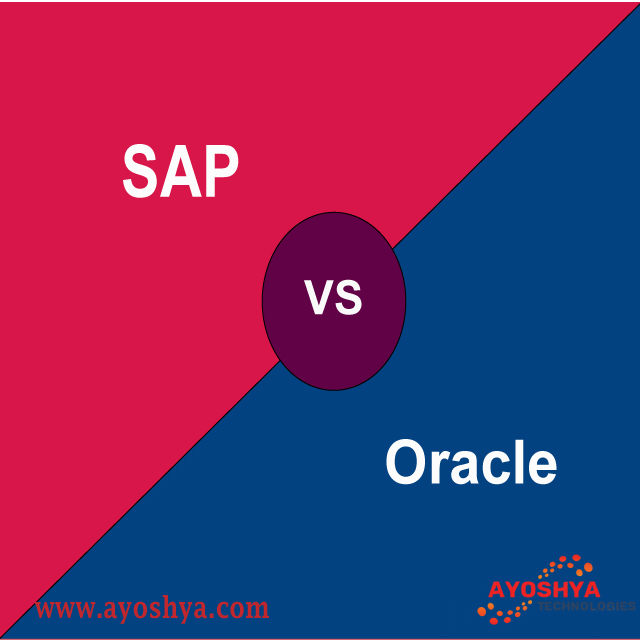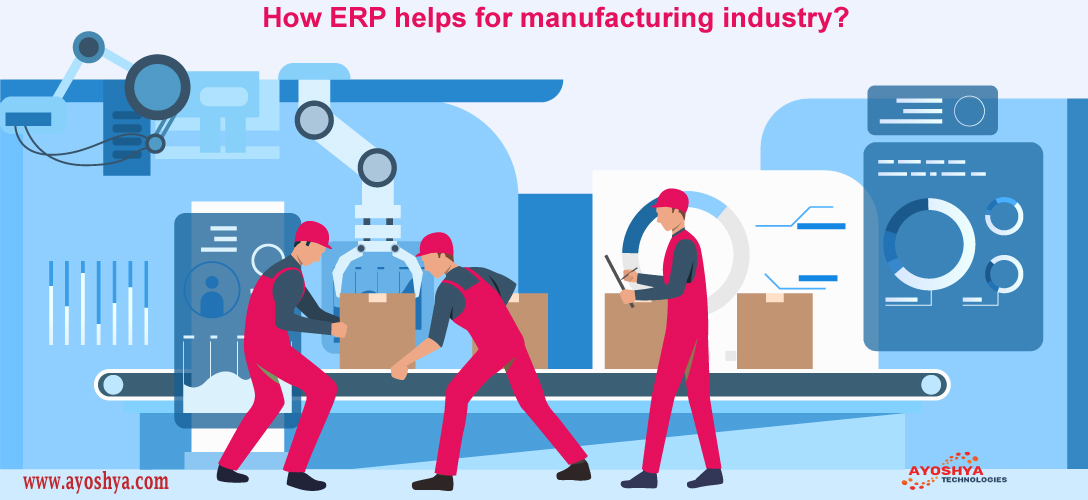SAP v/s Oracle
SAP and Oracle are the two major vendors in the world for ERP application. SAP started in 1972 and is headquartered at Walldorf, Germany. SAP started with the single-tier SAP system, and now it has a range of products right up-to cloud solutions and AI. Oracle, founded in 1977, California, started with its first flagship product, a database. Under business applications, Oracle’s first product was General Ledger functionality and then gradually started offering other features too in its Oracle eBusiness Suite. Like SAP, Oracle also moved on to cloud-based solutions and machine learning.
According to research firm Gartner, in 2018, of the global ERP market, Oracle had an 11% share while SAP had a share of 22%. Being tier 1 players, both the ERPs have robust platforms and have a vast customer base. In this article, we will explore the strengths and challenges of both ERPs.
Time and Cost
Two critical factors for an ERP system implementation is the time taken for implementation and cost. On average Oracle’s customer takes 1.2 years to implement, SAP projects implementation goes for around 1.5 years[i]. SAP’s markets to the companies with a billion-dollar in annual revenue. These implementations are global and have customizations.
According to Panorama’s survey, the cost of ERP implementation should be less than 2% for a company’s annual revenue. However, more than half of the companies with ERP would agree on cost over-runs. In terms of the percentage, SAP customer spends 4% of its annual revenue while the average Oracle customer spends 1.7% only[ii].
Multiple Hosting Option
Gone are the days when companies with ERPs preferred on-premise implementation. With lower initial investment and price flexibility among other benefits, these days the trend is for hosting your ERP On-Cloud.
SAP has three ERP cloud solutions for every business type, whether large, medium or small. These are subscription-based (SaaS), cloud-based ERP. Irrespective of the business industry. These solutions include modules to manage business data.
SAP S/4 HANA Cloud is for large enterprise-level
SAP Business ByDesign Cloud is for medium enterprise level
SAP Business One Cloud for a small or midsize company
Oracle has Fusion Cloud ERP. Oracle Cloud’s application suite promises seamless functionality across different modules like finance, HR, and supply chain. Few modules but not limited to offer on-cloud by Oracle are Financials, Project Management, Procurement, Risk Management Supply Chain Management and Analytics for cloud ERP.
However, both the ERPs are in the middle of transitioning the legacy products like SAP ECC, Oracle eBusiness Suite, Oracle NetSuite, and Plex Systems.
Recommended Reading How ERP helps for Manufacturing Industry?
Scalability
Businesses grow and expand, making it critical for their ERPs to support this growth. SAP and Oracle ERPs, both have proven scalable capabilities.
SAP has a single system giving a consistent feel. It has developed its products in-house and integrated them into one system. Whereas, Oracle has the best-of-breed option with JD Edwards, Fusion, E-Business Suite, Hyperion, and Siebel. Therefore, companies looking for scalability with standardization and consistency, SAP is the best option. For a decentralized model and more flexibility, Oracle ERP is the best option.
Customer Relationship Management (CRM)
SAP has integrated the customer relationship management (CRM) tool in its ERP system. Whereas, Oracles offers CRM as a stand-alone service, which can be integrated with the Oracle ERP Cloud.
SAP has built-in functionality that enables to manage marketing, sales and finance, giving you the complete information on your customers. Customers’ behavioural trends and history makes it easy to forecast sales and manage receivables.
Whereas, Oracle doesn’t offer a complete sales functionality within the ERP Cloud product. They are becoming a disadvantage for the sales teams. However, few outstanding features like strong financial management make it easier to get customer’s orders, sales records, making it extremely useful for strategic decision making.
Below are mentioned a few examples of the differences between SAP and Oracle ERPs.
- SAP supports the telephony interface functionality wherein inbound call queue management is present that puts the incoming calls to the next available operator. Oracle has third-party support for the same functionality.
- SAP supports competitor scenario analysis, whereas Oracle needs modification for the same.
To summarize. SAP excels in CRM, and Oracle’s strengths are in reporting capabilities.
Financials
Both SAP and Oracle ERP system offer a comprehensive financial feature like but not limited to pricing, accounting and budgeting. Oracle gives the flexibility to the user in terms of buying the complete financial product or required modules only. However, with SAP being an integrated ERP, this flexibility is a challenge.
Oracle offers risk management solutions, automates standard compliance present across industries. SAP’s risk management helps business identify and understand the risk factors. Oracle has a more comprehensive financial suite compared to SAP.
An example of the difference between the two ERPs is SAP supports each entity’s ledger having its accounting periods opened and closed, whereas Oracle needs modifications to support this.
Supply Chain Management
To track customers behaviour and manage customer relationships, CRM is available. However, suppliers can’t be left behind, which makes having SCM capabilities critical.
Distribution Management and the Purchase Order Processing feature of respective ERP is equally capable. SAP’s ‘procure to pay’ and ‘Order to cash’ module help companies manage purchases and contracts with vendors. It also helps in identifying trends to take strategic decisions. From supplier registration to invoice payment, Oracle’s ‘Supplier Invoice to Payment’ tools makes purchasing easier for a company.
The ERP start to diverge with Event Management and Advanced Planning System (APS). SAP is better with event management with better visibility of the supply chain, and Oracle has better APS, allowing companies to track costs and allocate resources accordingly.
Inventory
Inventory management is an essential part of all the manufacturing companies. Both the ERPs, equally efficient, provide real-time information on stock availability. This prevents disruption of the production process because of a shortage of supply. Real-time data makes the process efficient, and the company can meet its market’s demand on time. Oracle prides in boosted productivity and SAP takes pride that it completely prevents stock shortages.
As an example of the difference between the two is planning of BOM against actual orders, Oracle supports this whereas SAP needs modification for the same.
Human Resource
SAP ERP provides companies with tons of HR functions, such as payroll, simple employee onboarding, and allowing employees to self-manage timesheets, procurement processes, and personal information management. SAP also provides e-recruiting functionality, that optimizes recruiters’ work patterns and increases their productivity. It also includes workflow support.
Oracle has the Human Resources Management System. This software manages internal HR functions like payroll, recruitment, training, talent and employee engagement, and employee attendance. This HR software today is present as human capital management cloud solutions.
Example of a difference between both ERPs is the functionality of review and maintain deduction information for automatic bill payment service. SAP supports this functionality and, Oracle needs modification for the same.
As we have seen Oracle E-Business Suite and SAP ERP both are equally capable with not much advantage over each other. Functionality wise, SAP has more as compared to Oracle, but not more than 2% of the total. An ERP system should meet unique needs and wants for its company. Some companies need standard business processes while others go for deep customizations. A company should first internally introspect and discuss their requirements from an ERP, their existing business processes, standardization needs and scope of the change. Implementing ERP impacts employees too. Employees should be familiarized and trained for the ERP.
ERP will be a significant investment in time and money. A successful implementation will allow the business to operate efficiently and cost-effectively.
If your company is trying to decide between an SAP product and an Oracle product, our ERP consultants can help. Request a free consultation below.




